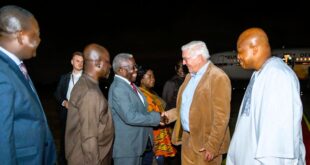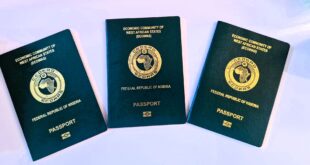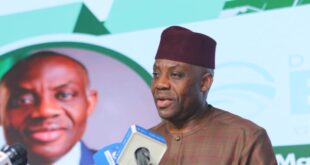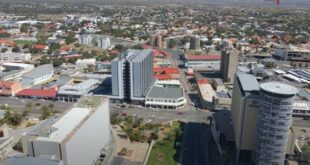Thousands of people are fleeing villages in the English-speaking regions of Cameroon less than a week after President Paul Biya declared war against Anglophone separatist groups. Fleeing villagers complain troops are engaging in rape, killings, and harassment, but the military says they are out to defend the population.
The number of people travelling along the Kumba Mamfe Road in the English-speaking South West region of Cameroon has drastically dropped. It is along this road that goods from Nigeria are brought into Cameroon and vice versa.
Thirty-two-year-old merchant Takem Ethel said she and her peers suspended business trips between Cameroon and Nigeria after President Biya declared war on separatist groups.
“The number of checkpoints are just unbearable,” said Ethel. “Since the president announced that he was fighting against terrorists, it is as if he removed his hungry lions called the military from their den. Those who want to be killed can travel. I still have my life ahead, so I will not move.”

Ongoing violence
Violence in the towns of Mamfe and Eyumojock last week claimed the lives of at least six soldiers and a police officer.
Eyumojock is also the hometown of Julius Ayuk Tabe, the man who said he is the first president of Ambazonia, the state the separatists say they have created.
The government of Cameroon says many fighters were being trained there and across the border in Nigeria.
Residents say most youths have escaped to the bushes to flee the heavy presence of the military.
Nyeke George Likiye, an independent analyst in southwestern Cameroon, said he has written to the national government to complain about the troops.
“They are doing their job in excess proportions,” said Likiye. “There are some arrests, some unreasonable arrests that are being done, people are being tortured, people are being beaten. This is not correct.”

Military denials
General Melingui Noma, one of Cameroon’s highest-ranking military officers, denied the southwest has been militarized or that soldiers are committing atrocities. The general said he is aware of alleged excesses but insisted the military is there to protect the population.
“We know that if we want to overcome this crisis, we have to make sure the population is with us,” he said. “How can you go and embarrass and harass people whom you want to take information from? If they cannot give us the correct information, if they cannot tell us the truth of what is happening in the field, you will see that the population will then turn and follow those secessionists.”
Schools have been closed in most of the English-speaking northwest and southwest since November of last year, when lawyers and teachers called for a strike to stop what they believed was the overbearing use of the French language. Violence erupted when separatists joined in and started asking for complete independence.
President Biya has said he is not open to any negotiation on the form of the state and that Cameroon is one country.

Cameroonian refugees in Nigeria
About a month ago, Nigeria authorities reported having received about 300 Cameroonians who registered as refugees after entering via the Nfum border of the southeastern Cross River State. Since then thousands more have arrived from Cameroon.
The head of the Nigerian Immigration Service, Mohammed Babandede was quoted as stressing that they were ready to ensure the safety of the refugees.
“We will respect human rights but won’t allow the migrants to spoil our security situation. We will treat them with dignity. The Cameroonian government has done the same for us during the Boko Haram crisis,” he said.
UNHCR has announced that it was planning to help up to 40,000 people fleeing violence from Cameroon’s North West and South West regions. A spokesperson, Babar Baloch, added that the UN agency was working with Nigerian authorities to scale up assistance.
English speakers have long decried marginalization from the government and planned a symbolic independence declaration on 1 October under the Ambazonia republic banner. A security clampdown of the protests left several people dead, many injured and hundreds detained.
The United Nations, European Union and other international partners have called for dialogue and for the government to respect the rights of protesters.
Adira Kallo with agency
 THE AFRICAN COURIER. Reporting Africa and its Diaspora! The African Courier is an international magazine published in Germany to report on Africa and the Diaspora African experience. The first issue of the bimonthly magazine appeared on the newsstands on 15 February 1998. The African Courier is a communication forum for European-African political, economic and cultural exchanges, and a voice for Africa in Europe.
THE AFRICAN COURIER. Reporting Africa and its Diaspora! The African Courier is an international magazine published in Germany to report on Africa and the Diaspora African experience. The first issue of the bimonthly magazine appeared on the newsstands on 15 February 1998. The African Courier is a communication forum for European-African political, economic and cultural exchanges, and a voice for Africa in Europe.

































